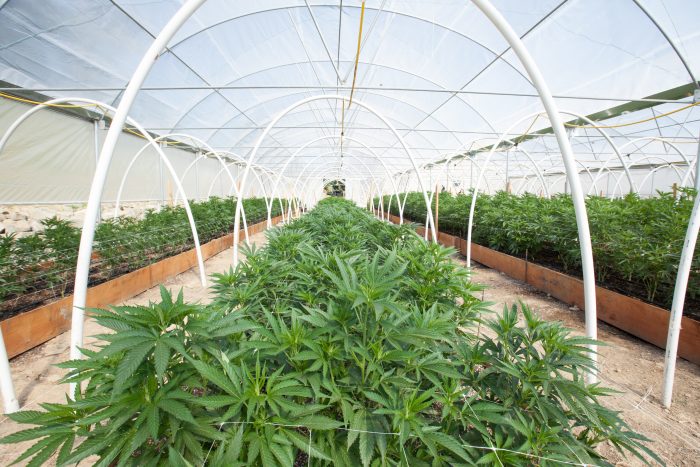Information will be updated here as it becomes available. Check back for updates! Please note; while we aim to keep this pages fully up to date with the latest information, cannabis laws are always changing. We encourage you to verify these rules and regulations in the official legal text, which we’ve linked throughout the page for your convenience.
New Mexico legalized the use of marijuana for recreational purposes under the Cannabis Regulation Act, effective June 29, 2021. Recreational marijuana is also commonly referred to as “adult use” cannabis to distinguish it from medical marijuana, which New Mexico legalized under the Lynn and Erin Compassionate Use Act in 2007.
Currently, New Mexico’s Cannabis Control Division (CCD) oversees licensing, taxing, and enforcing regulations for adult use cannabis. The CCD also administers the licensing and regulatory provisions of the Medical Cannabis Program.
Below you will find information regarding licensing procedures for dispensaries, producers, and manufacturers. We keep this page up-to-date when new information becomes available. Please note that this page is for informational purposes only and should not be considered legal advice.
Definition
Dispensaries sell recreational or medical cannabis and cannabis products in a legal, regulated setting.
Requirements – Medical and Adult Use Dispensaries
Applicants must undergo a background check. A criminal history screening is required for each partner of a limited partnership, each member of a limited liability company, and each director, officer, or trustee of a corporation or trust. Any controlling person—an officer, board member, or individual that controls a financial and/or voting interest of a cannabis establishment and is at least 21 years old—must also undergo a criminal history screening.
Process – Medical and Adult Use Dispensaries
The Cannabis Control Division (CCD) will first conduct a background check of the applicant’s controlling persons. Each controlling person must submit their fingerprints to the New Mexico Department of Public Safety and the Federal Bureau of Investigation for state and federal criminal history reports. The results will then be released to the CCD for review.
Next, applicants must complete and submit their Cannabis Retailer Application using the CCD’s online application portal. There is a nonrefundable application fee, along with an annual license fee of $2,500.
A license will either be granted or denied within 90 days of the CCD accepting a completed application.
If an applicant submits an incomplete application, the CCD will send them an email specifying the missing information or materials that need to be sent in. All licensing or renewal fees are nonrefundable and must be paid after each new application.
Similarly, the CCD may request that an applicant provide additional information in order to process and fully review their application. If the CCD does not receive the requested information within 90 days, it will deny licensure.
Upon written request of the applicant, the CCD may issue a provisional license letter with the remaining items necessary for the application to be considered complete. Applicants have six months to obtain and submit the necessary items. If more time is needed, the CCD may extend the provisional license letter for an additional six months. The provisional license letter does not permit an applicant to purchase, possess, sell, or dispense cannabis or cannabis-infused products; applicants can only exercise the privileges of licensure after the CCD approves their application and issues an official license.
What kind of software do I need to operate a Dispensary?
Most states require dispensaries to track and trace all of their cannabis-related products for regulatory and compliance reporting requirements. Our Dispensary Point of Sale and inventory management system provides comprehensive seed-to-sale cannabis tracking with a focus on compliant data points. If your state requires seed-to-sale systems to stay compliant, BioTrack has you covered. Our system is customized to meet the unique regulatory frameworks in each and every state.
Definition
Producers, also commonly referred to as growers or cultivators, are responsible for growing cannabis. Once harvested, mature plants are transferred to processors. In New Mexico, there are two classes of producers: cannabis producers and cannabis producer microbusinesses. A cannabis producer microbusiness cannot possess more than 200 mature cannabis plants at any given time.
Requirements – Producers
Applicants must undergo a background check. A criminal history screening is required for each partner of a limited partnership, each member of a limited liability company, and each director, officer, or trustee of a corporation or trust. Any controlling person—an officer, board member, or individual that controls a financial and/or voting interest of a cannabis establishment and is at least 21 years old—must also undergo a criminal history screening.
Process – Producers
The Cannabis Control Division (CCD) will first conduct a background check of the applicant’s controlling persons. Each controlling person must submit their fingerprints to the New Mexico Department of Public Safety and the Federal Bureau of Investigation for state and federal criminal history reports. The results will then be released to the CCD for review.
Next, applicants must complete and submit their Cannabis Producer Application using the CCD’s online application portal. There is a nonrefundable application fee. The annual licensing fee for a producer is $2,500, plus an annual fee of $10/plant for each mature commercial cannabis plant and $5/plant for each mature medical cannabis plant. For a producer microbusiness, the annual licensing fee is $500 for growing 100 plants or less and $1,000 for growing over 100 plants.
A license will either be granted or denied within 90 days of the CCD accepting a completed application. Annual plant fees must be paid upon the CCD’s approval of the initial application and approval of the number of cannabis plants that a licensee may grow.
If an applicant submits an incomplete application, the CCD will send an email specifying the missing information or materials that need to be sent in. All licensing or renewal fees are nonrefundable and must be paid after each new application.
Similarly, the CCD may request that an applicant provide additional information in order to process and fully review their application. If the CCD does not receive the requested information within 90 days, it will deny licensure.
Upon written request of the applicant, the CCD may issue a provisional license letter with the remaining items necessary for the application to be considered complete. Applicants have six months to obtain and submit the necessary items. If more time is needed, the CCD may extend the provisional license letter for an additional six months. The provisional license letter does not permit an applicant to plant, grow, or harvest cannabis (except for personal use); applicants can only exercise the privileges of licensure after the CCD approves their application and issues an official license.
What kind of software do I need to operate a Production Facility?
Most states require dispensaries to track and trace all of their cannabis-related products for regulatory and compliance reporting requirements. Our cannabis production and inventory management system provides comprehensive seed-to-sale cannabis tracking with a focus on compliant data points. If your state requires seed-to-sale systems to stay compliant, BioTrack has you covered. Our system is customized to meet the unique regulatory frameworks in each and every state.
Definition
Also known as processors, manufacturers take harvested cannabis from producers and create derivative extracts for edibles, concentrates, topicals, and prepacks. Once finished, their products are transported to dispensaries. In New Mexico, there are four classes of manufacturers:
- Class I manufacturers only package and repackage cannabis products and label and relabel the cannabis product container.
- Class II manufacturers conduct Class I activities and create cannabis products using infusion processes. They do not conduct extractions.
- Class III manufacturers conduct Class I and II activities and extract using mechanical methods or nonvolatile solvents.
- Class IV manufacturers conduct Class I, II, and III activities and extract using volatile solvents or supercritical carbon dioxide.
Requirements – Manufacturers
Applicants must undergo a background check. A criminal history screening is required for each partner of a limited partnership, each member of a limited liability company, and each director, officer, or trustee of a corporation or trust. Any controlling person—an officer, board member, or individual that controls a financial and/or voting interest of a cannabis establishment and is at least 21 years old—must also undergo a criminal history screening.
Process – Manufacturers
The Cannabis Control Division (CCD) will first conduct a background check of the applicant’s controlling persons. Each controlling person must submit their fingerprints to the New Mexico Department of Public Safety and the Federal Bureau of Investigation for state and federal criminal history reports. The results will then be released to the CCD for review.
Next, applicants must complete and submit their Cannabis Manufacturer Application using the CCD’s online application portal. There is a nonrefundable application fee, along with an annual license fee of $2,500.
A license will either be granted or denied within 90 days of the CCD accepting a completed application.
If an applicant submits an incomplete application, the CCD will send an email specifying the missing information or materials that need to be sent in. All licensing or renewal fees are nonrefundable and must be paid after each new application.
Similarly, the CCD may request that an applicant provide additional information in order to process and fully review their application. If the CCD does not receive the requested information within 90 days, it will deny licensure.
Upon written request of the applicant, the CCD may issue a provisional license letter with the remaining items necessary for the application to be considered complete. Applicants have six months to obtain and submit the necessary items. If more time is needed, the CCD may extend the provisional license letter for an additional six months. The provisional license letter does not permit an applicant to manufacture or transport cannabis or cannabis-infused products; applicants can only exercise the privileges of licensure after the CCD approves their application and issues an official license.
Every license holder and employee involved in the handling, transportation, manufacture, extraction, testing, and packaging of cannabis products must successfully complete a food handler course accredited by the American National Standards Institute prior to conducting business. License holders must have documentation that proves the fulfillment of this requirement.
What kind of software do I need to operate a Manufacturing Facility?
Most states require dispensaries to track and trace all of their cannabis-related products for regulatory and compliance reporting requirements. Our cannabis manufacturing management system provides comprehensive seed-to-sale cannabis tracking with a focus on compliant data points. If your state requires seed-to-sale systems to stay compliant, BioTrack has you covered. Our system is customized to meet the unique regulatory frameworks in each and every state.
Vertically Integrated Cannabis Establishment
A vertically integrated cannabis establishment license authorizes a business to do one or more of the following: produce cannabis, manufacture cannabis products, dispense cannabis products, and transport cannabis products.
Applicants must meet all qualifications for each type of cannabis activity they intend to undertake. Applicants must request to add or remove a cannabis establishment activity by submitting an amended application and paying any required fees. If an applicant does not plan to run all cannabis establishment activities on a single premises, they must pay a fee for each additional premises. An applicant cannot conduct any activity until they receive written approval from the Cannabis Control Division (CCD).
Integrated Cannabis Microbusiness
An integrated cannabis microbusiness license authorizes a business to do one or more of the following:
- Produce cannabis at a single licensed premises, provided that it does not possess more than 200 mature cannabis plants at any given time.
- Manufacture cannabis products at a single licensed premises.
- Sell and transport only their own cannabis products.
- Operate a single dispensary.
- Transport cannabis products to qualified patients, primary caregivers, reciprocal participants, or directly to consumers.
Applicants must meet all qualifications for each type of cannabis activity they intend to undertake. Applicants must request to add or remove a cannabis establishment activity by submitting an amended application and paying any required fees. An applicant cannot conduct any activity until they receive written approval from the Cannabis Control Division (CCD).
Cannabis Consumption Area with On-Site Retail
A cannabis consumption area with on-site retail is a licensed premises where cannabis can be purchased for on-site consumption only. The cannabis consumption area must be limited to one of the following uses:
- Consumption of cannabis by smoking, vaping, and ingesting edible products. 2. Consumption of cannabis edible products by ingestion only.
The application can be found on the Cannabis Control Division (CCD) website.
What kind of software do I need to operate these other business types?
Most states require dispensaries to track and trace all of their cannabis-related products for regulatory and compliance reporting requirements. Our cannabis POS and inventory management system provides comprehensive seed-to-sale cannabis tracking with a focus on compliant data points. If your state requires seed-to-sale systems to stay compliant, BioTrack has you covered. Our system is customized to meet the unique regulatory frameworks in each and every state.






